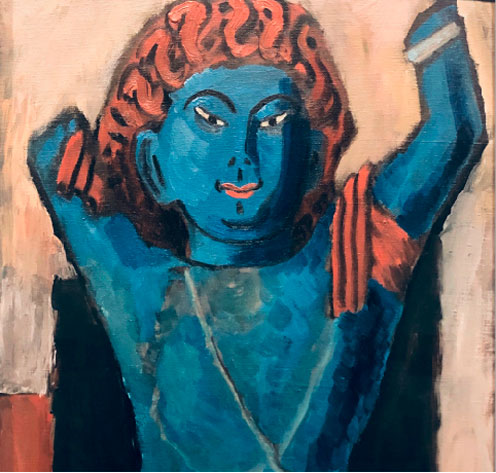Indo-European Religion and Poetics
A Comparative Approach: Myth, Ritual and Language
Follow us
Follow the conference on our YouTube Channel.
The talks will be made available on the conference Facebook page and on Instagram account @ie_religion_poetics

Der blaue Dämon (1931) by Gabriele Münter
Gabriele Münter und Johannes Eichner-Stiftung, München
Photo: Laura Massetti, Louisiana Museum, Copenhagen, 2018.06.03
Religion and poetics, ritual and myth are central, fascinating dimensions of the ancient world, which somehow have never stopped talking to us. Indeed, as Aby Warburg wrote, “where the technical explanation of cause and effect replaces the mythical imagination, man loses his primitive fears. But we should be loth to decide whether this emancipation from the mythological view really helps mankind to find a fitting answer to the problems of existence” (A Lecture on Serpent Ritual, Journal of the Warburg Institute 2/4: 291). Through the study of ancient myth and ritual we learn more about the ancient societies to which they belonged. At the same time, the in-depth analysis of ancient stories teaches us something about modern man's truest fears and desires.
This conference focuses on the Indo-European language family and spotlights Indo-European religion and poetics. The event brings together scholars who have an interest in Indo-European traditions, in order to encourage an interdisciplinary dialogue on diverse, yet interwoven aspects of Indo-European culture, such as ritual, myth and language. The conference especially endeavors to exploit the full potential of the linguistic reconstruction for the analysis of Indo-European literary and religious texts. It is undeniable that the genetic study of the origins of myths and rituals changes the way we look at single literary texts as well as at our archetypes. On the one hand, it sheds light on the dynamics of the style and storytelling of individual authors who, within their own geographical and temporal settings, juggle between uniqueness and traditionality. On the other, the comparative perspective on ancient religions uncovers similarities among apparently distant traditions. In this way, it enables us to develop a balanced perception of our cultural identity.
Keynote speakers
- José Luis García Ramón (Harvard Center for Hellenic Studies)
- Peter Jackson Rova (Stockholm University)
- Stephanie W. Jamison (University of California, Los Angeles)
- Joshua Katz (Princeton University)
- Claire Le Feuvre (Sorbonne University)
Other speakers
- Milena Anfosso (Sorbonne University / UCLA)
- Lucien Van Beek (University of Leiden)
- Michele Bianconi (University of Oxford)
- Riccardo Ginevra (Harvard Center for Hellenic Studies)
- Federico Giusfredi, Valerio Pisaniello (University of Verona)
- Stefan Höfler (University of Copenhagen)
- Adam Hyllested (University of Copenhagen)
- Laura Massetti (University of Copenhagen)
- John McDonald (University of Missouri)
- Angelo Mercado (Grinnell College, IA)
- Rostislav Oreshko (University of Leiden / Harvard Center for Hellenic Studies)
- Tao PAN (Ludwig Maximilian University Munich)
- Corinna Scheungraber (University of Cologne)
- Bjarne Simmelkjær Sandgaard Hansen (University of Copenhagen)
- Esbern Thøgersen (University of Copenhagen)
- Kenneth G. Zysk (University of Copenhagen)
The conference is organized by Laura Massetti. She is head of the project 'Family Myths' which has received funding from the European Union’s Horizon 2020 research and innovation programme under the Marie Skłodowska-Curie grant agreement No. 793479.
Programme and abstracts
Final programme (pdf) and Book of abstracts (pdf).
Talks
Handouts and powerpoint presentations will be available here shortly after the conference.
The conference will be live streamed.
Registration
Please register here no later than 30 September 2019.
Organiser
The conference is organized by Laura Massetti. She is head of the project Family Myths which has received funding from the European Union’s Horizon 2020 research and innovation programme under the Marie Skłodowska-Curie grant agreement No. 793479.

